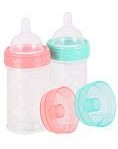 It turns out that plastic baby bottles shed millions of tiny plastic particles (microplastics) into the breast milk, formula, or water in them. At this point we don't really know what ingesting multitudes of microplastics every day does to a person, but assume that it is not beneficial and we should try to lower how much we ingest. (Microplastics are turning up in foods and water, especially bottled water - we are ingesting them, excreting them, and there is some concerning health research.)
It turns out that plastic baby bottles shed millions of tiny plastic particles (microplastics) into the breast milk, formula, or water in them. At this point we don't really know what ingesting multitudes of microplastics every day does to a person, but assume that it is not beneficial and we should try to lower how much we ingest. (Microplastics are turning up in foods and water, especially bottled water - we are ingesting them, excreting them, and there is some concerning health research.)
Trinity College researchers found that the greatest number of microplastics are shed into the baby bottle contents when polypropylene bottles are heated, especially during bottle sterilization. The research team estimated that current guidelines for infant bottle sterilization and formula preparation result in an average daily ingestion by European and American babies of more than 2 million microplastics every day! Yikes!
What to do? Absolute best would be to use glass baby bottles - no plastic there. But if plastic baby bottles are used: 1) first sterilize the bottles. 2) Then rinse the sterilized bottles 3 times in water that has been sterilized (boiled and cooled) in a stainless steel or glass pot. 3) Same with the formula - heat in a non-plastic container (glass or stainless steel) and then pour it into the plastic baby bottle.
Also: do not heat formula in plastic containers or microwave ovens. Do not vigorously shake the formula in the bottle at any time. Do not use sonication to clean plastic baby bottles.
Shedding of microplastics is a property of plastic polypropylene bottles, and the hotter the bottle - the more is shed. Shaking also releases microplastics. The only way to avoid the problem of microplastics in the formula or other liquid is to use glass baby bottles.
From The Scientist: Baby Bottles Can Shed Millions of Microplastic Particles: Study
Plastic has long been a major source of pollution in landfills and in oceans, especially as it degrades into pieces smaller than 5 millimeters, termed “microplastics.” Experimental studies have shown that these particles and the cocktail of chemicals they carry can wreak havoc on physiology, reproduction, development, and behavior in a number of nonhuman species. ...continue reading "Plastic Baby Bottles Shed Tiny Plastic Particles"
